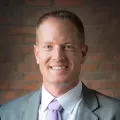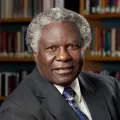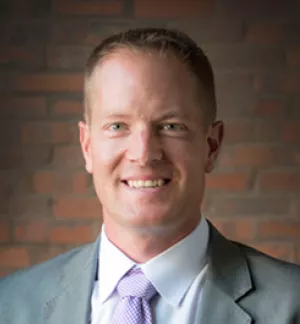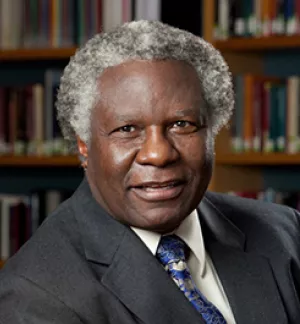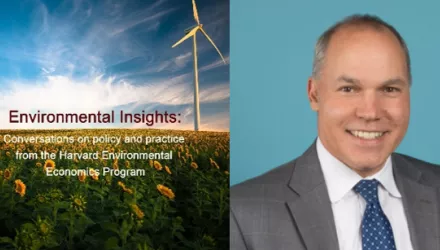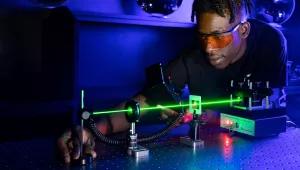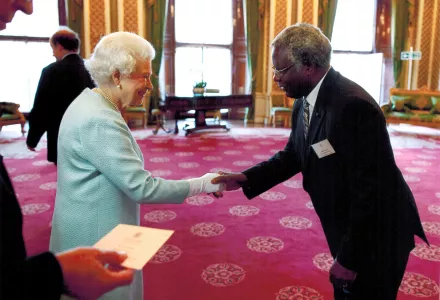
When he was 12 years old, Calestous Juma got an unusual notice from his priest: official dispensation to miss mass. The reason? Kenyan locals near Lake Victoria had come to depend on Juma to fix household items, including radios—and that was his only time to make repairs. The priest agreed he was “doing God’s work.” Neighbors would drop items on the way to church and pick them up after. “It was a lot of pressure,” Juma recalls. His savvy with electronics made him a minor celebrity. More important, his first experience with DIY repairs and entrepreneurship taught him the most critical skill of all: learning how to learn.
Today, Juma is still learning and fixing things—just on a much broader scale. As director of the Belfer Center’s Science, Technology, and Globalization Project, Juma works to better leverage scientific and technological knowledge for poor and vulnerable communities around the world. From STEM education and agricultural innovation in Africa to 3D printing and mobile cook stoves, he embodies the Center’s commitment to advancing science and technology to build a more secure, peaceful world. In June, Juma will accept the prestigious Breakthrough Paradigm Award for his scholarship and thought leadership in biotechnology and innovation.
At a time of growing anxiety over artificial intelligence, robot workers, and self-driving cars, Juma’s 2016 book, Innovation and Its Enemies, reminds us that fights over technology are hardly new. Drawing on case studies from over 600 years of technology history, including coffee, the printing press, margarine, refrigeration, and recorded music, Juma chronicles a recurring pattern of public skepticism and social adjustment.
“When people talk about technology, they tend to see an object,” Juma says. “They ignore the social and human aspects that go into shaping that technology.” He learned that the hard way when he helped engineer a cook stove for developing communities. To improve efficiency, Juma concluded that the prototype’s metallic cylinder should be replaced with a clay lining. But then metal makers complained about losing jobs. Meanwhile, he had built the stove to minimize smoke. But users balked at early models. The reason? Smoke kept mosquitoes away. He redesigned the stove accordingly, using both clay and metal. “We miss this human element all the time,” Juma says, stressing the need for “inclusive innovation.”
The 19th century Harvard naturalist Louis Agassiz wrote that every great scientific truth goes through three stages. “First, people say it conflicts with the Bible. Next, they say it has been discovered before. Lastly, they say they always believed it.” In Juma’s corollary, first people say new technology excludes the poor; then governments want to control it; finally, we can’t imagine life without it. He recalls that when mobile phones emerged, development experts said these toys for the rich would have no impact on society. Then prices started to drop—and government started to worry. A Nigerian intelligence agent told Juma his country did not want to see mobile phones adopted widely because government would lose surveillance access. Today, cell phones are indispensable. “When technology becomes infrastructure, then good things happen,” Juma says.
But bad things happen, he warns, when policy is crafted without scientific thinking. “A large part of the debate over the environment,” he says, “is because the majority of people have not had scientific training; they think all growth is linear. But we don’t consider exponential growth.” Many of the world’s toughest challenges—from climate change and famine to deadly pathogens—require the ability to deal with exponential threat projections. “We can’t solve these without science.”
Today, this former soccer captain is not slowing down. From viral social media posts to his upcoming autobiography, his writing remains prolific and infused with the humor of a man whose laugh can be heard across the Center’s hallways. A recent tweet—a quote from Plato—reads: “One of the penalties for refusing to participate in politics is that you end up being governed by your inferiors.”
Burek, Josh. "A Lifelong Champion for 'Inclusive Innovation'." Belfer Center Newsletter, Belfer Center for Science and International Affairs, Harvard Kennedy School (Summer 2017).

